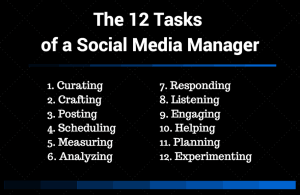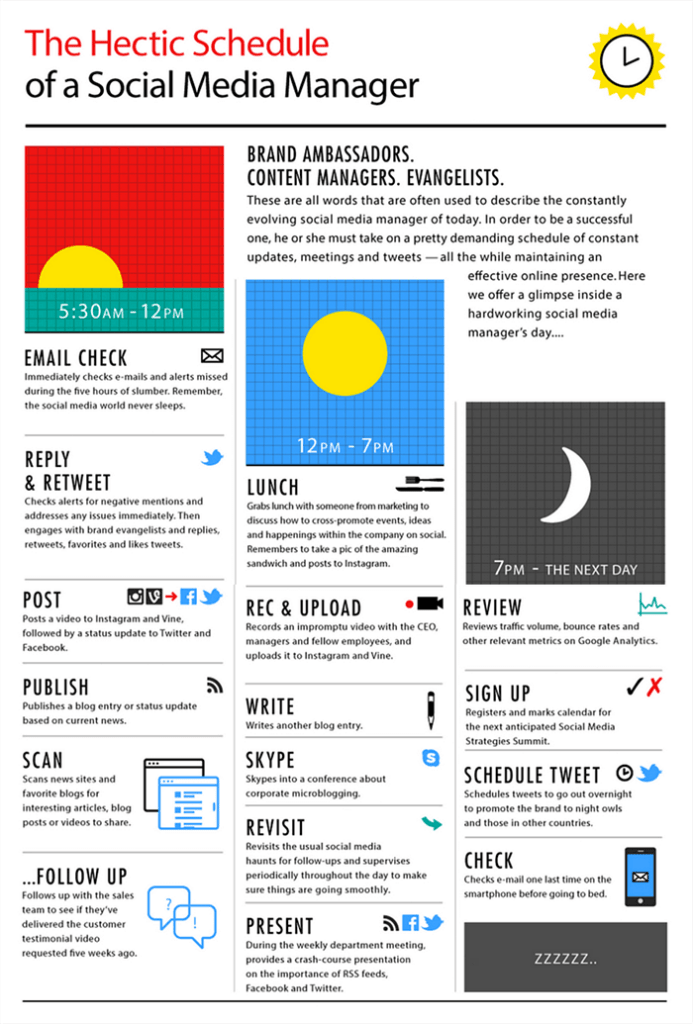Social media management has become such an integral part of our everyday lives we do it without thinking. We check our Facebook, Twitter and Instagram accounts in any idle moment and subconsciously note which posts are popular and take photos that you know would get a good response on the chosen platform. Most people enjoy interacting over social media on a personal level, which give rise to the thinking that interacting on a professional level is just as easy. That’s about as true as saying, ‘I went to Germany by aeroplane – twice, so that qualifies me to be a pilot’. Social media management is a
pay.
and reproduced them as this interesting infographic. Clearly, professional
This schedule may look ‘pumped up’ and ‘unrealistic’ but it is based on the average social media managers day. Tasks vary wildly, but Mark Smiciklas of Intersection Consulting produced
to include pretty much every element that he comes in contact with as a social media manager during a ‘normal’ working week:
One thing that both these illustrations teach us is that a personal social media suite, however comprehensive, in no way resembles a professional one.
The Personal Blogger/Tweeter/Poster/Instagramer – take your pick!
When you are managing a personal social media account there are ‘no holds barred’. You can broadcast anything you want, any way you want, often with no real goal in mind. There is no tailoring to an audience, a
personal media space is truly ‘all about me’, and if people don’t like it – they don’t have to keep following. You owe them nothing, and they owe you nothing. You pick it up and put it down as you fancy. If you’re busy, you don’t post, if you ‘don’t feel like it’, then you don’t have to. Often the goal is simply to get ‘likes’, so quality of subject means nothing.
Some personal blogs have made the crossover to business blogs. One industry in question is ‘Mommy Blogging’. These are blogs that are a series of posts relating to motherhood, home, family and crafting, set up by mostly ‘Moms’, stay at home or not, that generate huge following of other ‘moms’ which are then sponsored by interested industries. These blogs are highly stylised and produced professionally, some even employing marketing firms and assistants to make that attractive to users, paid for by sponsors and liberally sprinkled with advertising. They may have started a personal social media site, but they don’t remain in the personal domain when marketing sponsorship is achieved, and they also tend to stop managing the site themselves.
The Professional Social Media Manager
A professional social media manager plans their social media like a military operation. Nothing is left to chance. Every move is made after consulting the metrics, tracking and evaluating their efficacy in the industry, and then watching them like a hawk so that any indication of a success or failure is maximised for campaign success. Not only is there a tremendous amount of pressure to perform, that pressure is there 24/7/365 as the social media marketing arena never sleeps.
Taking accountability for social media is no small task. In real life the maximum amount of platforms one social media manager can effectively leverage is four. Social media is all about listening and engaging. You don’t do that by throwing three posts a week on a platform, and then leaving to deal with running your company. Each platform has its own strengths and weaknesses, but also its own audience. If you don’t learn how to engage them then you will never be able to introduce them to your company as customers.
This in itself isn’t an impressive as most people can only name four social media sites, but when you sit down and think about it, there’s
Facebook,
Twitter,
Google+, YouTube,
LinkedIn,
Pinterest,
Instagram, Vine,
Vimeo, Stumbled Upon … we could go on, and all of them have large audiences that can be leveraged if you take the time to know how to do it. That’s where social media managers step in. They can step in and quickly navigate the confusion to success.
There are many attributes of a good social media manager, but Kevan Lee of
Buffer social created a list of the 12 most important:

This is a good list of all the different attributes of social media management, but it’s a good idea to understand why so you can see the value of a social media program.
CURATING:
Content is the mainstay of any social media program and
curating is the art of selecting and vetting the right content that speaks to your audience. All content in online marketing is curated. There is no room for random posts, everything has to be building the brand or it doesn’t belong on your social media.
Social media can travel very far, very fast, so you need to be protective over what you post – ALWAYS
CRAFTING:
Having the right content is only half of battle to creating a viral post. Knowing how to present it so that your audience
want to share it is the other half. Shared posts are curated and crafted with headlines that invite people to engage, use the language they want to interact with and arrange it in a way they can’t resist.
POSTING:
Social media management includes knowledge of when and where to post, but also knowledge of the tools that allow posting to be faster and more efficient. There are many tools that help with scheduling of the different platforms and each has a different strengths. There is also an amount of crossover from platform to platform, and a definite structure in the cycle that content takes down the sales funnel, and all of this needs to be structured.
SCHEDULING:
The time of day you post your content makes a big difference. Social media management uses the metrics to know when your posts will make the most impact, then schedules accordingly. Nothing is random or without a goal, and this takes a lot of organization. Scheduling can make or break a great post.
Never forget – being social media management is always planned like a military operation, or it just doesn’t work.
MEASURING:
Measuring is another very important aspect of military precision social media management. Everything needs to be tracked, and that means
everything. If you want to attract clicks, then you need to know where the clicks are coming from, if you want viral content, you need to know what is attractive.
One of the benefits of using a scheduling tool is that there are metrics on everything, and they are all metrics you would need.
ANALYSING:
Once you have the metrics you need to become adept at analysing them. They are not numbers – they are the buying behaviours of your chosen demographic and you need to learn from them. As you build up a profile of your consumers you can best serve them.
RESPONDING:
When your social media campaign starts to be effective, you will start to get responses. These comments and retweets need to be acknowledged. Reaching out to your leads and consumers shows that you care and that they are important to the company. This builds the company brand, and company loyalty. Sometimes a thumbs up, personal message or reply is all it needs.
LISTENING:
One of the biggest advantages of social media management is the ability to listen to your customers, or more correctly, listen
in on your customers. Conversations carry on in text, so you can see what consumers pain points are, where they are purchasing and what they are recommending. It gives you a unique perspective on what is really happening with your customers, but not just
your customers – your competitor’s customers too.
ENGAGING:
A dedicated social media manager is practised at engaging an audience and keeping them engaged. They know how to launch and manage delight campaigns, encourage conversations, char and reach out. They also know how to use content already on the net to the campaigns advantage and bring in more engagement.
HELPING:
Seth Godin talks about how marketing needs to stop
selling and start
helping. Social media is one way that you can reach out and help your consumers, prospective consumers and leads in a natural and genuine way. You can also do it in real time which helps dramatically in nipping problems in bud and containing them before they grow out of control. It also helps in directing your customers to where they need to go with speed, which increases your credibility.
There is a lot of help you offer via the social media channels as it puts you where your customers are and in a unique position to offer that help, and increase your brand credibility at the same time.
PLANNING:
Planning is crucial to social media success. This takes time and experience to do successfully when you take into account how complex successful social media is. Taking everything into account and making a plan that accounts for all the pitfalls that could occur takes lots of skill.
EXPERIMENTING:
On top of maximising the use of what we have, and what we know, great social media manager also experiments with new content, new media and new presentations. That experimentation includes evaluating what is found to be up and coming in social media marketing.
Keeping an ear to the ground on seeing what is on the horizon, then guessing how successful will be on the media is no easy task. But a social media manager can manage it.
 Talk to a person
Talk to a person
 This schedule may look ‘pumped up’ and ‘unrealistic’ but it is based on the average social media managers day. Tasks vary wildly, but Mark Smiciklas of Intersection Consulting produced
This schedule may look ‘pumped up’ and ‘unrealistic’ but it is based on the average social media managers day. Tasks vary wildly, but Mark Smiciklas of Intersection Consulting produced 
 This is a good list of all the different attributes of social media management, but it’s a good idea to understand why so you can see the value of a social media program.
This is a good list of all the different attributes of social media management, but it’s a good idea to understand why so you can see the value of a social media program.

